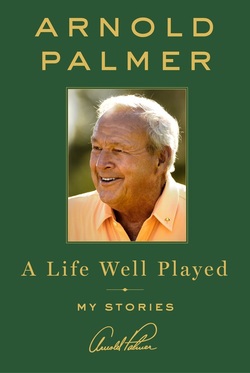
He never liked to be called “The King,” but my favorite story about Palmer took place at the Monarch Country Club west of Stuart, Florida, in 1987. The Monarch symbol was actually a butterfly and not a crown, but Palmer designed the golf course for the Martin Downs community and visited to play an inaugural round.
On the back nine, Palmer was preparing to hit in the fairway when a small plane buzzed the course. Palmer stopped, stepped away from the ball, peered into the sky, grinned and then turned to the gallery.
“Must be Nicklaus,” he said, drawing laughs from the crowd.
Jack Nicklaus was a rival and friend to Arnie and lived one hour south of the course Palmer was christening. But Palmer had many friends, in the game of golf and beyond. He was genuine, humble, courteous and a credit to the game. He was patient and answered all questions, and signed autographs for any fan who wanted one. And not a scribble, either. His penmanship was almost as good as his game.
Normally I don’t jump the gun on books. Palmer’s upcoming book, A Life Well Played: My Stories (St. Martin’s Press) is due to be released October 25. But because of his death Sunday, it’s worth an early review.
Palmer put together 76 different short stories in A Life Well Played — observations, if you will — about golf and life.
He drew on the lessons taught to him by his father, Deacon Palmer (Arnie always called him Pap): “He taught me to be a sportsman, to show good sportsmanship,” he writes. “But he didn’t just teach me to play golf. He taught me a discipline that things should be done a certain way — as well and as hard as you can.”
The results have been more than satisfactory, with 62 PGA Tour titles and seven majors — four Masters, two British Open crowns and a U.S. Open championship.
Palmer talks about his greatest victories — the 1960 U.S. Open is one of them, when he rallied from a seven-shot deficit to win at Cherry Hills. And his most painful losses, particularly the 1966 U.S. Open, when he blew a seven-shot lead on the back nine at San Francisco’s Olympic Club during the final round to allow Billy Casper to win — “one of the most baffling (rounds) I have ever encountered.”
He reminisces about Augusta National and the Masters and gives advice about fame — “if they want the perks of stardom, they have to accept the responsibilities, too.”
He also writes about “Arnie’s Army,” his go-for-broke style that endeared him to golf galleries, and signing autographs through the mail — in recent years, he routinely spent $250,000 annually on postage.
Palmer notes the satisfaction and joy of opening a children’s hospital in Orlando, the famous people he has met and the love of his wives and children. Plus, the adulation of so many golf fans who now are mourning his passing.
“If I’ve enhanced the game and people’s enjoyment of the game, I would feel like I accomplished something,” he writes.
You did, Arnie. You did.
A postscript. When Palmer was done playing the Monarch course in 1987, I asked him if he had a few minutes to chat for a story. He said sure, after he took a bathroom break. There was only one toilet in the trailer — the place was new and the clubhouse was under construction — and whoever was in the restroom was taking forever. So there's Arnie, shifting from side to side, having to use the restroom. He looks at me and winks. “Don't worry, you're not gonna get a scoop.”
I almost fell over.
 RSS Feed
RSS Feed
